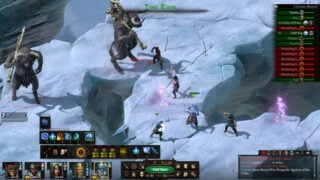
Fighting a pack of wolves is very different from fighting a team of skilled spellcasters. The rhythm and style of a battle is also determined by the enemies you face. Even on normal the game presents a stiff challenge, and in tougher battles you really do have to play with a strategy in mind. Depending on who’s in your party and the skills they have, battles can play out in a multitude of different ways. If you’ve never played an Infinity Engine game before, think of the combat as like a real-time strategy game, but with the ability to pause at any time and plan your next move.

Violence isn’t always the answer in Pillars of Eternity.īut sometimes it’s unavoidable, so it’s a good thing the combat is excellent too. It also lets you, in true classic RPG style, talk your way out of tense situations, using your intellect or charm to defuse them. This gives you fine control of your character’s personality, which enhances the role-playing side of things significantly. The more you act a certain way, the more your reputation will grow around it. This is called your disposition, and there are loads of ways to shape it: benevolent, cruel, clever, stoic, rational, deceptive, honest, passionate, clever. A city official might shun you because of your bad attitude, but a shady character down by the docks will see it as a positive trait. Get enough of those and people will react appropriately. This lowers your reputation in the city and gives you an ‘aggressive’ point. If your might stat is above 12, you can grab him by the shirt, hold him above your head, and demand he tell you where the secret is. To give an example, a quest in the city of Defiance Bay sees a kid asking you to buy a knife for him, in exchange for the location of a secret. There are dozens of factors that can come into play when you’re speaking to someone, from your race and reputation in a town, to your alignment with certain groups and your base stats. I haven’t done this much reading, and enjoyed it, in a game since Planescape: Torment.ĭialogue is also at the heart of the role-playing. Use your Watcher powers on selected NPC’s souls and you’re treated to expressive 500-word vignettes about their past. Click a magnifying glass icon on certain objects in the world and you’re treated to a totally unnecessary, but wonderfully evocative, description of them. This frees Obsidian to write mountains of text without having to worry about recording dialogue for it all, and the result is a vast amount of detail.Īs characters speak, their body language is described, giving you a sense of their personality. There’s some voice acting, from companions and in important story quests, but mostly you have to use your imagination. Page upon page of superbly written, vivid, descriptive text. The story in Pillars of Eternity is told largely through text. Waidwen’s Legacy, it seems, may be connected to your own predicament. However, this being an RPG, it’s not long before their fate becomes entwined in that of the Dyrwood itself. A useful power you might think, but an encounter with an old Watcher who has been driven mad by it sends your hero on a quest to discover who or what caused their awakening, in order to reverse the damage. They implant animal souls into children, power automated war machines with them, and perform all manner of bizarre, ungodly experiments that, understandably, have given them a bad reputation.Īfter surviving a deadly magical storm known as a bîaŵac, your hero’s own soul is ‘awakened’, turning them into a Watcher: a person who can use souls to see people's’ past lives. This mirrors the battle between science and religion throughout our own history, although animancers do a lot worse than tell people the world is round and clone farm animals.

Animancers are convinced their work will put an end to the curse, but others think it’s an affront to the gods. When your hero arrives in the Dyrwood, a mysterious curse called Waidwen’s Legacy is causing babies to be born without souls, which becomes an important part of the main quest.

Instead, the cultural tension comes from a controversial science called animancy, which involves the manipulation of souls.

There is, naturally, some animosity between certain races and factions, but it’s rarely at the forefront. The Dyrwood is fairly multicultural, and I’m glad Obsidian didn’t go down the road of making racism a big part of their world, which is a fantasy trope we've seen before in modern RPGs. People you meet will react to your race, class, and background, both positively and negatively, so the choices you make when you create your character have some meaning beyond personal preference and what you want your hero to look like.


 0 kommentar(er)
0 kommentar(er)
